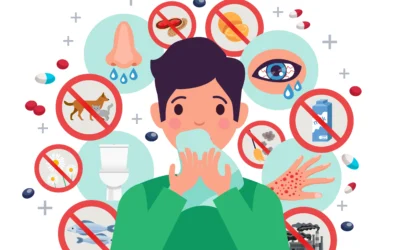In today’s busy world, it’s easy to fall into the trap of thinking about our health only when something goes wrong. We often wait until we feel sick or experience discomfort before making an appointment with our doctor. But what if we told you that taking a proactive approach to your health could prevent many of the issues we face later in life?
This is where preventive healthcare comes into play. Rather than waiting for symptoms to show up, preventive healthcare focuses on early detection, lifestyle changes, and regular check-ups to help you stay ahead of any potential health problems. It’s all about doing the right things now to avoid the worry, pain, and expenses of dealing with more serious conditions down the road.
In this blog, we’ll explore the importance of preventive healthcare and why regular check-ups matter so much. We’ll also highlight the services at Tilaknagar Speciality Clinic, a place where your health is always our priority, with a special focus on proactive care to keep you feeling your best.

Table of Contents
What is Preventive Healthcare?
Think of preventive healthcare as a shield for your body. It’s about doing everything you can to protect yourself from future illnesses. From regular health screenings to lifestyle changes like exercise and a balanced diet, preventive care helps ensure that you catch potential health problems early—when they’re easiest to treat. Preventive care is all about keeping you in good shape, both physically and mentally, and heading off chronic diseases like diabetes, heart disease, and cancer before they ever have the chance to take hold.
Some examples of preventive healthcare include:
- Routine Health Screenings: These are your regular check-ups—things like blood pressure monitoring, cholesterol testing, and cancer screenings that can help detect early signs of trouble.
- Vaccinations: Getting the flu shot or vaccines for diseases like pneumonia and hepatitis can protect you from illnesses that are preventable.
- Health Education: Knowing what foods to eat, how to move your body, and how to manage stress can dramatically reduce the risk of disease.
- Preventive Medications: For those at risk of certain conditions (like heart disease), doctors might prescribe medications to prevent problems before they start.
- Health Counseling: Whether it’s helping you quit smoking, lose weight, or find ways to reduce stress, personalized counselling can help you make lasting changes.
The goal of preventive healthcare is simple: prevent illness before it happens and manage risk factors effectively to keep you healthy for as long as possible.
The Benefits of Regular Check-ups
We’ve all been there—putting off a doctor’s visit because we’re feeling fine or too busy to make time. But let’s take a moment to understand just how much regular check-ups can benefit you:
1. Catching Problems Early
Many of us think that health problems only show up when something is wrong, but that’s not always the case. Diseases like cancer, heart disease, and diabetes can be lurking without showing any obvious symptoms. Regular check-ups, however, can help your doctor spot these conditions early when they’re much easier to treat. For instance, a routine mammogram can detect breast cancer long before you even feel a lump.
2. Keeping Chronic Conditions Under Control
If you already have conditions like high blood pressure, diabetes, or cholesterol, regular visits with your doctor can help you manage them better. It’s not just about getting a diagnosis—it’s about keeping things in check so they don’t escalate into something more serious. Think of it as maintenance for your body!
3. Prevention Over Treatment
It’s no secret that it’s more affordable to prevent a health issue than to treat one after it’s developed. By staying on top of preventive measures like vaccinations, screenings, and healthy lifestyle habits, you’re less likely to face expensive treatments and hospital visits in the future. A little time invested in your health now can save you a lot of stress and costs later.
4. Peace of Mind
We all have that moment when we wonder, “Am I okay?” Regular check-ups give you peace of mind. You can rest easy knowing that you’ve taken steps to stay ahead of any health concerns, which can reduce anxiety about the “what ifs” that keep us up at night.
5. Building a Relationship with Your Doctor
Visiting your healthcare provider regularly isn’t just about getting check-ups; it’s about building a lasting relationship. Having a doctor who understands your history, habits, and health goals means they can offer personalized advice that fits you, rather than a one-size-fits-all approach.
Common Preventive Screenings You Shouldn’t Skip
So, what exactly does a preventive check-up involve? Let’s take a closer look at the screenings that should be a part of your routine:
1. Blood Pressure and Cholesterol Checks
High blood pressure and high cholesterol are silent risk factors for heart disease and stroke. Luckily, they’re easy to catch with a quick test. Catching them early allows you to make changes that can prevent long-term damage to your heart and blood vessels.
2. Cancer Screenings
Screenings like mammograms for breast cancer, colonoscopies for colorectal cancer, and pap smears for cervical cancer are some of the most important preventive tools available. By detecting cancer in its early stages, these tests give you a much better chance of successful treatment.
3. Diabetes Screening
If you have a family history of diabetes or certain risk factors (like being overweight or sedentary), screening for diabetes through blood sugar tests can help you detect the disease early. Diabetes is a manageable condition if caught early, but it can lead to serious complications like kidney disease and nerve damage if left untreated.
4. Vision and Hearing Exams
Your senses are vital to your quality of life, and regular eye and ear exams can help detect issues before they affect your day-to-day. Whether it’s blurry vision or early-stage hearing loss, addressing problems early ensures better outcomes.
5. Immunizations
Vaccines are a simple but powerful way to prevent disease. Staying on top of recommended vaccines for flu, pneumonia, and other diseases can help protect both you and those around you.
Preventive Healthcare at Tilaknagar Speciality Clinic
At Tilaknagar Speciality Clinic, we believe in taking a holistic approach to your health. Our team is committed to providing you with the best preventive care to ensure that you stay healthy and active for years to come. Whether you’re in need of a routine check-up, vaccinations, or personalized advice on how to live a healthier life, we’re here for you.
Our clinic offers a comprehensive range of preventive services, including health screenings, blood tests, immunizations, and wellness counselling. We’re not just treating you when you’re sick—we’re working with you to ensure you stay well. With a focus on early detection and proactive care, Tilaknagar Speciality Clinic is your partner in lifelong health.
You can also explore all the specialities we provide at our Tilaknagar Speciality Clinic by visiting our Specialities Page.
How to Start Your Preventive Healthcare Routine
Taking the first step toward preventive healthcare is easier than you think. Here are some practical tips to get you started:
1. Book Regular Check-ups
Make it a point to visit your healthcare provider at least once a year for a routine check-up. Regular visits allow you and your doctor to stay on top of your health and catch anything early.
2. Maintain a Balanced Diet
Fuel your body with nutritious foods like fruits, vegetables, whole grains, and lean proteins. This helps keep your heart healthy, your weight in check, and your energy levels up.
3. Get Moving
Aim for at least 150 minutes of moderate exercise per week. Whether it’s walking, swimming, or cycling, staying active is crucial for maintaining a healthy body.
4. Manage Stress
Life can be stressful, but finding ways to relax—whether through yoga, meditation or simply taking time to unwind—can have a huge impact on your overall well-being.
5. Get Enough Sleep
Sleep is when your body does most of its repair and recovery. Make sure you’re getting enough rest each night (7-9 hours for most adults) to keep your immune system strong.
Conclusion
Preventive healthcare isn’t just about preventing illness; it’s about living a healthier, happier life. Regular check-ups, screenings, and lifestyle changes can help you stay ahead of potential problems and ensure that you enjoy a long and fulfilling life. At Tilaknagar Speciality Clinic, we’re committed to making preventive healthcare accessible and effective for everyone. Schedule your check-up today, and take control of your health for a better tomorrow!
FAQs
What is preventive healthcare?
Preventive healthcare focuses on taking proactive steps to prevent illness before it starts. This includes regular health check-ups, screenings, vaccinations, and lifestyle changes like proper diet and exercise. The goal is to catch potential health problems early and ensure you stay healthy for years to come.
Why are regular check-ups important?
Regular check-ups help identify potential health issues before they become serious. Routine screenings, such as blood pressure checks, cholesterol testing, and cancer screenings, can detect problems early when they’re easier to treat. It’s an essential part of maintaining long-term health.
What types of screenings are recommended as part of preventive healthcare?
Common preventive screenings include blood pressure and cholesterol checks, cancer screenings (like mammograms and colonoscopies), diabetes screening, and eye and hearing exams. These tests help detect underlying health issues that might not show symptoms yet.
How often should I get a routine check-up?
It’s generally recommended to visit your doctor at least once a year for a routine check-up, though the frequency may vary based on your age, medical history, and risk factors. Your healthcare provider can suggest a tailored schedule for check-ups and screenings.
How does preventive healthcare save me money?
Preventive care can save you money by catching health problems early, reducing the need for expensive treatments or emergency care later. It’s much cheaper and more effective to prevent a health issue than to treat it once it has developed into something serious.
Can lifestyle changes help prevent illness?
Yes, lifestyle changes like eating a balanced diet, exercising regularly, quitting smoking, and reducing stress can significantly reduce the risk of chronic conditions such as heart disease, diabetes, and obesity. Preventive healthcare encourages these changes to help you stay healthy.
What services are offered at Tilaknagar Speciality Clinic for preventive care?
At Tilaknagar Speciality Clinic, we offer a wide range of preventive services, including health screenings, blood tests, vaccinations, wellness counselling, and personalized advice on maintaining a healthy lifestyle. Our goal is to help you stay healthy and detect any potential issues early.
How can I get started with preventive healthcare at Tilaknagar Speciality Clinic?
You can start by scheduling a routine check-up with our healthcare providers. During your visit, we will assess your health, discuss your lifestyle, and recommend any necessary screenings or tests. Our team is here to guide you every step of the way.
What role does early detection play in preventive healthcare?
Early detection allows doctors to identify health issues before they develop into more serious problems. Conditions like cancer, heart disease, and diabetes can often be managed or treated more successfully when caught in their early stages.
Are preventive healthcare services covered by insurance?
Many health insurance plans cover preventive care, including routine check-ups, screenings, and vaccinations. However, it’s always a good idea to check with your insurance provider to understand the specific coverage and benefits of preventive services.








